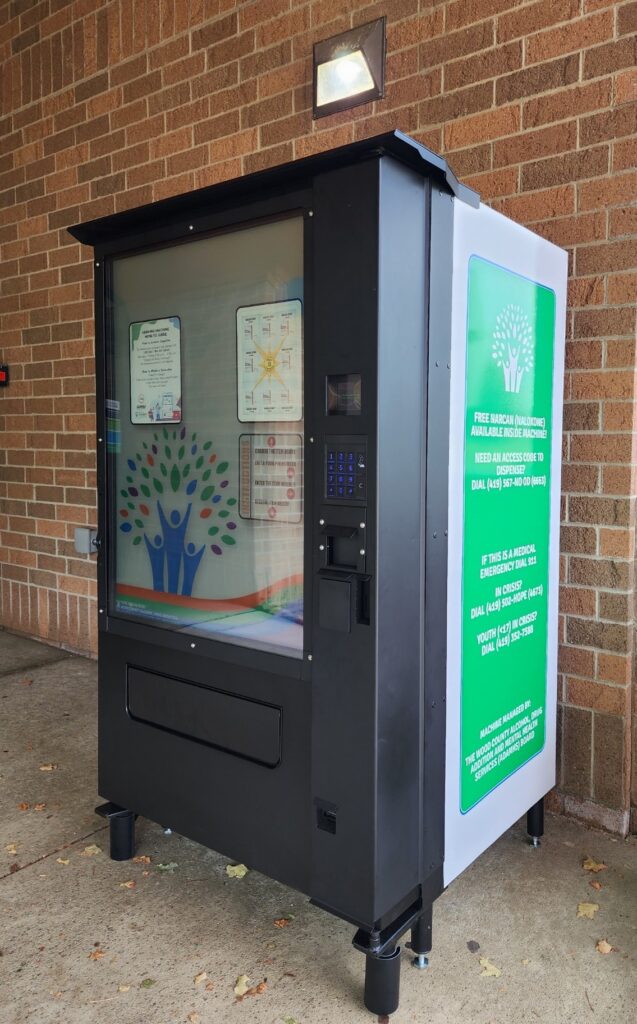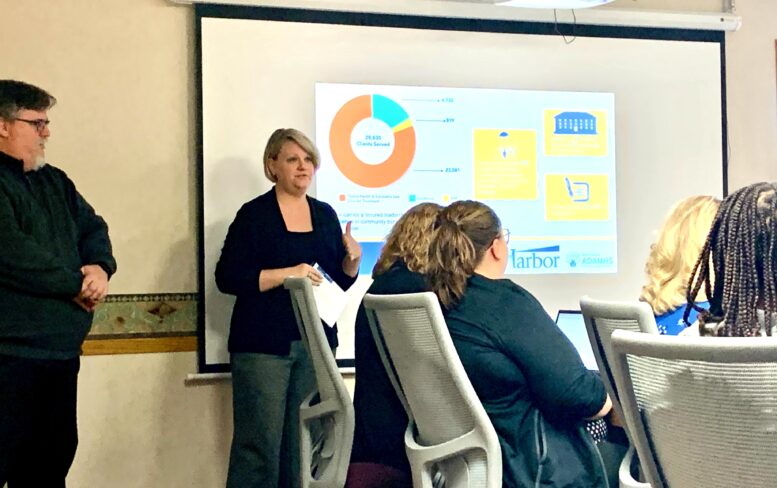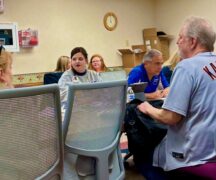By JULIE CARLE
BG Independent News
Three Narcan vending machines installed in Wood County by the Alcohol, Drug Addiction and Mental Health Services in August 2023 are getting an upgrade.
Access to the machines, located at the Wood County Health Department in Bowling Green. Midwest Recovery Center in North Baltimore, and Harbor in Perrysburg, is easier, Aimee Coe, WCADAMHS director of clinical and prevention programs, told the board at the March meeting.
Previously, when people wanted to use the vending machines, they had to call a special “No OD” phone line that was only available during regular business hours, talk to a WCADAMHS staff member and answer questions before being given an access code to dispense the Narcan.
“Privacy and confidentiality are no longer an issue because I think that was a barrier for some people who were nervous about calling,” Coe said. “They don’t want to give their information even though we didn’t ask their name.
“We felt there were benefits to eliminating the phone line,” Coe said. “We no longer have those requirements.”
The phone line still exists but only to provide an informational message if someone does call the number, she said. The message refers the caller to a flyer on the front of the vending machine that has access instructions.

Coe also announced the machines now carry fentanyl test strips in addition to the Narcan. The fentanyl strips test for the presence of fentanyl before a substance is used.
“It’s an evidence-based harm reduction technique that saves lives because people know what they are utilizing before they actually use the substance,” Coe said.
Individuals have access to either Narcan or fentanyl strips or both.
As of March 21, a total of 150 Narcan packages had been dispensed and three fentanyl strips (which had been added to the machine on Feb. 15).
The vending machine changes were made because the funding source, an Ohio State Opioid & Stimulant Response Grant, was eliminated.
Based on the grant requirements, there was only Narcan in the vending machines,” she said. “Because we no longer had to follow the grant requirements, we could make the changes.”
Recently, the state has offered “no-cost extension” funds for opioid and stimulants projects, that WCADAMHS plans to apply for and include in the request the cost of adding a new wrap to the vending machines to reflect the current process and costs for the software, Coe said. The cost would be $1,850 for the three vending machines.
“This is our first step towards how this is going to work,” she said in response to a question about adding other items to the vending machines. The machines can dispense various harm-reduction items such as needle exchanges, pregnancy tests and band aids, she said. “I’m open to that and would love to consider other things as we move in the future.”
Monitoring recovery housing
Ohio House Bill 58, which proposes changes to the current recovery housing language, makes the Wood County board responsible for monitoring and helping to create a certificate of need for the amount of recovery houses needed in the area, according to WCADAMHS Executive Director Amanda Kern.
CORRECTION: The bill has not been passed by either the House or the Senate; it is still in the House Community Revitalization Committee awaiting further testimony.
Though Wood County’s only recovery house, operated in Cygnet by the Zepf Center-, closed recently, the WCADAMHS Board will help certify recovery house/bed needs in the region.
Northwest Ohio Behavioral Healthcare is developing a new 16-bed housing unit on its South Detroit Avenue campus in Toledo. The step-down facility for individuals transitioning from long-term commitments is operated by the Lucas County board used regional dollars for the project.
Because regional funds were used, the Wood County board and other northwest region boards were referenced in the bill as being involved in the development and monitoring, Kern said.
“Counties who already have recovery housing beds and feel they are at capacity can be the ones to gatekeep and say no,” Kern said. “But then we also would have some requirements and authority for monitoring compliance and making sure that those recovery houses are running under the requirements.”
Harbor starts FY26 allocation process
Harbor Chief Clinical Officer Valerie Moyer and Chief Infrastructure Officer John Fortner updated the board about their services, as part of the board’s allocation process for Fiscal Year 2026.
Harbor has 24 locations throughout its service area, which includes Wood County. There are over 550 employees across all programs, of which 300 are psychologists, therapists, case managers, prescribers, and nurse practitioners.
“We have a fairly large number of individuals who can prescribe medications across all of our sites, and we offer a lot of teleservices,” Moyer said.
In 2024, Harbor provided services to 29,000 total individuals across all programs, with approximately 23,000 of those being outpatient mental health or substance use disorder services. Wood County residents accounted for more than 3,700 mental health service clients and 280 substance use disorder clients, she reported.
Services include one-on-one counseling and therapy and group counseling such as self-esteem, coping skills and grief groups.
Case management services are available, with case managers in the field 80% of the time, meeting clients in their homes, the community, and making sure they are getting where they need to be.
Other services include psychiatry, a day treatment program for mental health, and intensive outpatient programs for substance use disorders.
Harbor also has programs like Devlac Hall and Chrysalis residential treatment facilities for women, the Connection Center, various housing assistance programs, and the Individualized Placement and Support (IPS) employment program that served almost 5,000 individuals last year and about 800 through the employee assistance program.
Forensic and adult care facility monitoring is also provided for Wood County.
“Every county is required to have a person who follows anyone who has been found guilty by reason of insanity to watch treatment compliance, progress and to make sure they’re following any rules of their conditional release,” Moyer said. “Currently, we have about six Wood County residents that are on conditional release that our monitor is working with; about five more are at Northwest Ohio Behavioral Healthcare or other state hospitals.”
The forensic monitor also oversees local individuals who are placed in adult care facilities outside of Wood County; currently there are four people in that arrangement.
Reviewing the outcomes for the agency, Laura Fullenkamp, WCADAMHS director of planning and evaluation, said Harbor is currently serving about the same amount they served last year meeting the necessary outcomes.
Substance use disorder services have met two outcomes, have two within tolerance level and one that is in flux because of language. Fullenkamp is working with the Ohio Department of Mental Health to determine “what they want us to look at within our outcomes.”
Forensic monitoring continues to meet all expectations and the Individualized placement service exceeds expectations, she said.
Housing assistance is meeting a majority of the stated outcomes, except for one facility, which is undergoing renovation. “But that is an understandable reason that we’re not concerned about,” she explained.
Proposed changes for the Connection Center will require an adjustment to the outcomes before the contracts are finalized for next year, Fullenkamp said.
“John did a nice job of talking about all the intense courses they’ve been doing over the last year to help bring down some of their requests (for funds) and maximizing the other funding streams,” Kern said.
“As we went into allocations this year, we talked about how everyone would be looking at an 8% cut,” she said. “We are just about there. The only other thing that we still have a question about before we’ll get these finalized numbers was they’re on track to spend more on their fee-for-service than they currently are budgeted.”
An amendment may be necessary to increase Harbor’s fee-for-service line for the current fiscal year, Kern said.
In other business, the board:
- Approved a resolution to support the Cocoon Shelter Capital Project, which was awarded a $100,000 state capital grant to redo the parking lot. There is no cost to the county board; they must ensure the money is used for its intended purpose.
- Heard the Wood County Suicide Prevention Coalition has two events planned: Youth Resiliency Jubilee on June 11 from 11 a.m. to 2 p.m. at the Wood County Fairgrounds and the 2nd Annual Glo Walk on June 27 at 9 p.m. at the fairgrounds.





